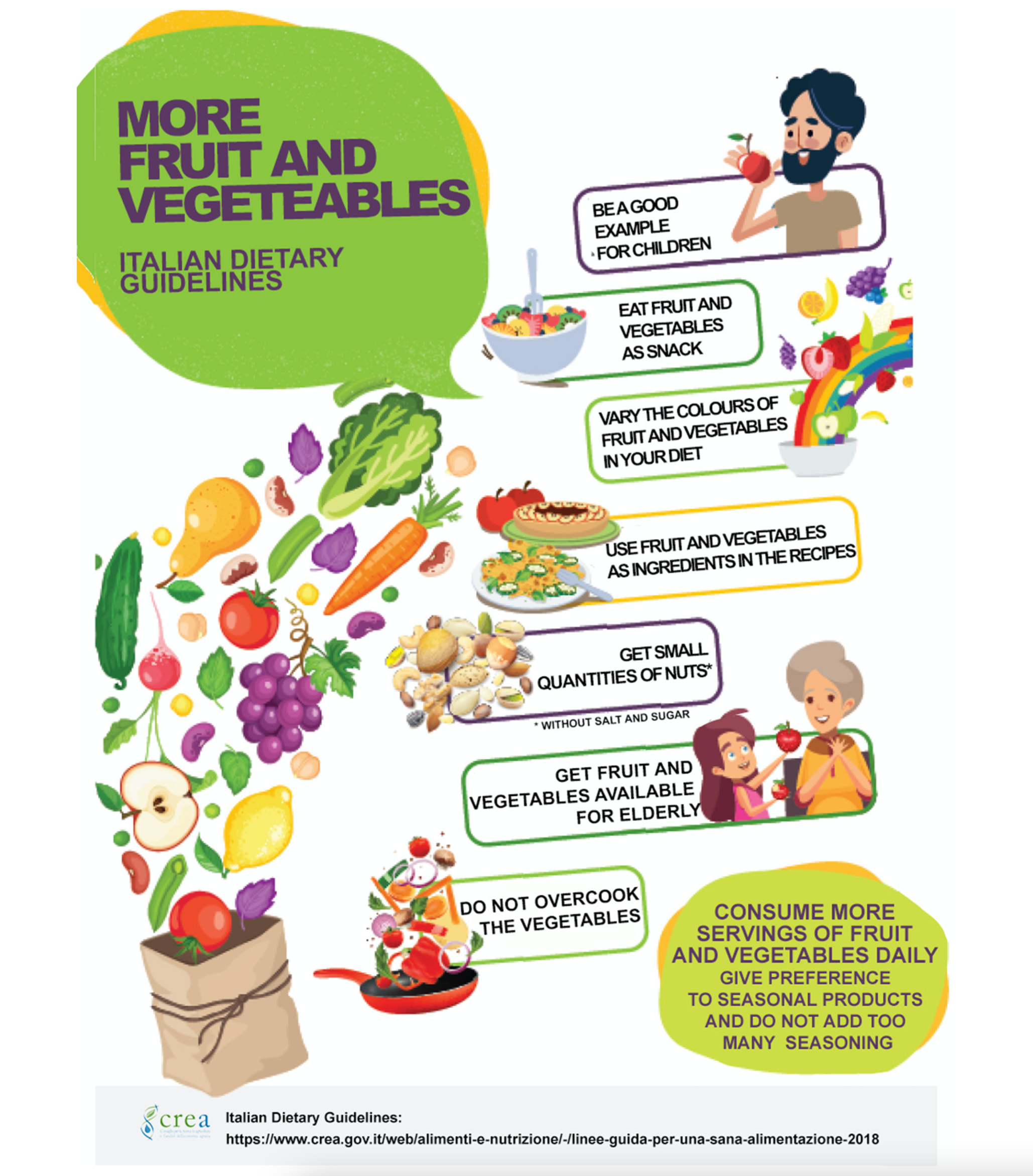
The 13 Directives of the Italian Dietary Guidelines
The latest 2018 Italian Dietary Guidelines (IDGs) regulated by the law and endorsed by the scientific community, are based on the ideals of the Mediterranean Diet, a well-known and widely accepted dietary lifestyle to promote health and prevent diet-related chronic diseases, achieve longevity, and health with consumer acceptance and sustainability. An official endorsement from FAO and WHO was provided and was included as a preface of the final IDGs document.
Food products and eating practices associated with the Mediterranean Diet differ from nation to country. The IDGs were developed to align the Mediterranean diet principles with the most recent global guidelines.
The IDGs recommendations apply to all age groups, including newborns, the elderly, pregnant and lactating women, athletes, and persons with medical issues. View the original document
Balance
1. Keep your weight under control and always be active
In the case of overweight, reduce food intake and increase physical activity.
Avoid very restrictive diets that exclude entire food groups.
Be careful with extreme food behaviors that could be symptoms of eating disorders.
Increase consumption
2. Eat more fruits and vegetables
Increase fruit and vegetable consumption by limiting the addition of added fats and salt.
Choose seasonal fruit and vegetables in varying colors.
Fruit juice cannot replace a portion of fresh fruit.
3. Eat whole grains and legumes
Increase consumption of fiber by choosing whole-grain products.
Increase legume intake as an alternative to animal-sourced food.
Remember the importance of whole grains as protective factors for non-communicable diseases.
4. Drink abundant water every day
Water must be the preferred fluid for rehydration.
Drinks at least 8 glasses of water a day, more is better.
Increase water intake during physical activity.
Reduce consumption
5. Fats: select which ones and limit the quantity
Reduce your intake of saturated fat by choosing foods containing unsaturated fatty acids for cardiovascular prevention.
Remember that all fats have the same caloric content.
Remember that in Italy, trans-fatty acids are no longer used in industrial products.
6. Sugar, sweets, and sugar-sweetened beverages: less is better
Reduce your intake of sugar in favor of starchy foods.
A high intake of sweetened beverages is a risk factor for non-communicable diseases, including diabetes
and obesity.
Remember that brown sugar, honey, and fructose are not healthy alternatives to sugar..
7. Salt: less is better (but iodized)
Reduce your salt intake and choose iodine-fortified products.
Remember that several industrial products are hidden sources of salt (e.g., breakfast cereals).
Remember that salt intake is an important risk factor for non-communicable diseases, in particular heart disorders.
8. Alcoholic beverages: the least possible
Avoidance of alcohol from any source, including wine and beer, is the best for health.
If you decide to drink alcohol, it is for your pleasure, not for your health. Limit the quantities: no more than 1 alcoholic unit (e.g., a glass of wine) per day for females and the elderly, and 2 alcoholic units per day for males.
No alcohol of any type is to be given to children, adolescents, pregnant women, or lactating women.
How to
9. Enjoy a variety of food choice
Remember that choosing a variety of foods is a way to guarantee nutritional adequacy.
Variety does not mean more food. Portions and frequencies must be adequate for energy consumption at different ages and physiological statuses.
The Mediterranean Diet is the dietary pattern that inspires the Italian Dietary Guidelines.
10. Follow special recommendations for target groups
Remember that children have special needs during infancy. Select foods of high quality in adequate quantity.
Pregnancy and breastfeeding are physiological periods that require attention: best to think about that before, arriving at these moments in good health and putting in place all preventive actions needed (e.g., folic acid supplementation).
The elderly need to eat a little less because their energy metabolism slows down, but the quality of the food must be higher, without forgetting to maintain an active lifestyle.
11. Be careful of dieting and misuse of dietary supplements
Dieting is a therapeutic act that requires trained professionals; consumers should avoid referring to non-qualified people.
Losing weight requires time and constancy; “everything and immediately” is not compatible with dieting.
Dietary supplements could be important in cases of deficiency, but they should never substitute for a healthy diet.
12. Food safety depends also on you
At home, be careful to adequately store food in the refrigerator.
At the supermarket, in the grocery cart and bags separate fruit and vegetables from meat, poultry, and
fish to avoid cross-contamination.
Prepare the kitchen, clean the sink before and after washing and preparing fresh fruit and vegetables, and use different cutting boards and preparation areas for meat, poultry, fish, and fresh fruits and vegetables. Wash especially well between the preparation of meat, poultry, or fish and the preparation of food that will be eaten without cooking.
13. Select a sustainable diet
Avoid processed meat and reduce red meat consumption in favor of poultry or vegetable sources of protein. Select fish from sustainable stocks, e.g., small fish from the Mediterranean Sea (anchovies, sardines, mackerel, etc.); do not demonize aquaculture.
Increase consumption of plant food, avoiding the selection of products that require large amounts of external inputs for growing (e.g., high fertilizing, artificial light, heating, or overseas products).
Planning, preparing, and storing food can help consumers waste less food, save money, and eat healthier food. Re-use old ingredients or leftovers in new dishes.
